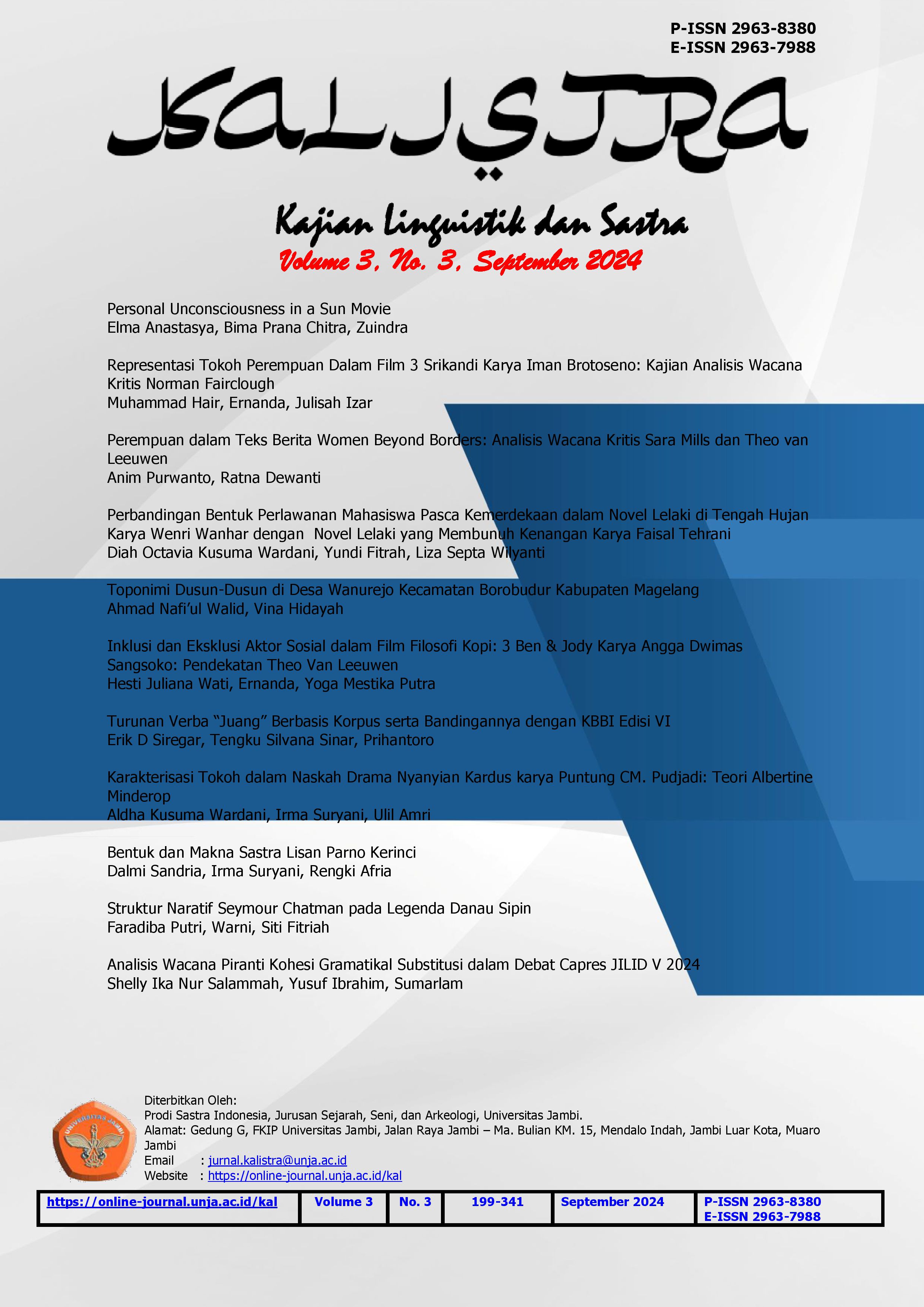Kritik ekologis dalam Novel Memburu Kasih Perempuan Sampan Karya Abdul Kadir Ibrahim
DOI:
https://doi.org/10.22437/kalistra.v3i3.42884Keywords:
kritik, ekologi, novel, sastraAbstract
This research aims to uncover ecological criticism in the novel "Memburu Kasih Perempuan Sampan" by Abdul Kadir Ibrahim. This research is a descriptive qualitative study using an ecocritical perspective to describe the data in depth. The data in this study consists of sentences that contain issues related to environmental damage found in the novel. Data were collected through repeated reading stages, then classified, analyzed, and concluded. The results of this research show that there are three forms of ecological criticism in the novel "Memburu Kasih Perempuan Sampan," including: criticism of the issue of sand resource exploitation, criticism of illegal logging, and the issue of the impact of exploitation on nature and the lives of local communities.
Downloads
References
Anggarista, R. (2020). Kritik Ekologi dalam Kumpulan Cerpen Cemara Karya Hamsad Rangkuti. Jurnalistrendi : JURNAL LINGUISTIK, SASTRA, DAN PENDIDIKAN, 5(1), 56–65. https://doi.org/10.51673/JURNALISTRENDI.V5I1.196
Harsono, S. (2012). Ekokritik: Kritik Sastra Berwawasan Lingkungan. KAJIAN SASTRA, 32(1), 31–50. https://doi.org/10.2/JQUERY.MIN.JS
Ihsan, B. (2022). Dampak Kearifan Lingkungan Berdasarkan Kajian Ecocriticism Dalam Novel Serial Anak-Anak Mamak Karya Tere Liye. Jurnal Metamorfosa, 10(2), 22–31. https://doi.org/10.46244/METAMORFOSA.V10I2.1857
Indah Angelita, R., Fitrah, Y., Septa Wilyanti, L., Pendidikan dalam Novel Kami Sarjana Kertas Karya Khairen, N. J., Semiotika Nilai Pendidikan dalam Novel Kami Sarjana Kertas Karya Khairen, K. J., Semiotika, K., … Kunci Nilai Pendidikan Novel Kajian Semiotika Roland Barthes, K. (2024). Nilai Pendidikan dalam Novel Kami (Bukan) Sarjana Kertas Karya J.S. Khairen: Kajian Semiotika. Kajian Linguistik dan Sastra, 3(1), 37–42. https://doi.org/10.22437/kalistra.v3i1.24899
Kaswadi, K. (2015). Paradigma Ekologi Dalam Kajian Sastra. Paramasastra : Jurnal Ilmiah Bahasa Sastra dan Pembelajarannya, 2(2). https://doi.org/10.26740/PARAMASASTRA.V2N2.P
Malik, A. (2017). Dampak Eksploitasi SDA Terhadap Kesejahteraan Masyarakat dalam Pandangan Etika Bisnis Islam: (Studi Kasus Tambang Galian C Di Kecamatan Pasir Sakti. Lampung Timur). Nizham Journal of Islamic Studies, 5(2), 58–76. Diambil dari https://e-journal.metrouniv.ac.id/nizham/article/view/990
Putri, S. S., & Winda, N. (2022). Kritik Ekologi Sastra Dalam Novel Rumah Debu Karya Sandi Firly Melalui Pendekatan Ekologis. Stilistika: Jurnal Bahasa, Sastra, dan Pengajarannya, 7(1), 17–27. https://doi.org/10.33654/STI.V7I1.1740
Sihotang, A., Nurhasanah, E., Triyadi, D. S., & Karawang, U. S. (2021). Analisis Ekokritik Dalam Novel Kekal Karya Jalu Kancana. Jurnal Metamorfosa , 9(2), 141–158. https://doi.org/10.46244/METAMORFOSA.V9I2.1482
Sultoni, A. (2020). Kritik Ekologis dalam Buku Puisi Air Mata Manggar Karya Arif Hidayat: Kajian Ekologi Sastra. JP-BSI (Jurnal Pendidikan Bahasa dan Sastra Indonesia), 5(1), 6–10. Diambil dari https://journal.stkipsingkawang.ac.id/index.php/JP-BSI/article/view/1356
Taqwiem, A. dan D. A. (2020). Sampah Dalam Novel Aroma Karsa Karya Dewi Lestari: Tinjauan Ekologi Sastra. Jurnal Bahasa, Sastra Dan Pembelajarannya, 10(1), 1–11. https://doi.org/10.20527/JBSP.V10I1.8392
Downloads
Published
How to Cite
Issue
Section
License
Copyright (c) 2024 Tessa Dwi Leoni

This work is licensed under a Creative Commons Attribution-ShareAlike 4.0 International License.
Kalistra: Kajian Linguistik dan Sastra is licensed under Creative Commons Attribution-ShareAlike 4.0 International License.
Authors who publish their manuscripts in Kajian Linguistik dan Sastra agree to the following terms:
1. The copyright in each article belongs to the author.
2. The author acknowledges that Kajian Linguistik dan Sastra reserves the right to be the first to publish under a Creative Commons Attribution-ShareAlike 4.0 International License (Attribution 4.0 International CC BY-SA 4.0).
3. Authors may submit articles separately, arranging for non-exclusive distribution of manuscripts that have been published in this journal to other versions (e.g., delivery to the author's institutional repository, publication into a book, etc.), acknowledging that the manuscript has been first published in Kajian Linguistik dan Sastra.
















